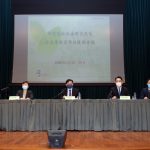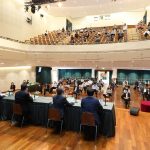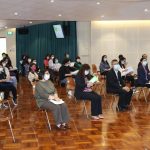 DSEJ holds school meetings on resumption of classes (1)
DSEJ holds school meetings on resumption of classes (1)
The Education and Youth Affairs Bureau (hereinafter referred to as the “DSEJ”) held two school meetings on class resumption at the Millennium Hall of Santa Rosa de Lima College (Chinese Section) on 28th and 29th April respectively. In the meetings, the DSEJ discussed with the persons-in-charge or representatives of the 77 schools in Macao about the details of the work of class resumption, including the arrangement for teaching and non-teaching staff and cross-border students to take the nucleic acid testing, sharing experience obtained from the simulation drill of class resumption, cleaning of school premises, implementation of the friendly measure, student assessment and suggestions for promotion/retention as well as the epidemic prevention measures that cross-border teachers and students have to follow before returning to school, to ensure smooth resumption of classes in May.
The DSEJ announced earlier that non-tertiary education schools would resume classes in stages from May. Senior secondary schools will be the first to resume classes on 4th May and junior secondary schools will resume classes on 11th May. For resumption of classes in kindergartens, primary and special education schools, it will be announced later in accordance with the epidemic situation. During the period of class suspension in response to the epidemic situation, the DSEJ has maintained closed communication with education groups and schools. Through multiple meetings, the DSEJ formulated the “Guidelines for Class Resumption” together with the education groups. Schools are supported to carry out simulation drill on class resumption between 20th and 29th April in accordance with the “Guidelines for Class Resumption”.
To cooperate with the SAR Government’s overall epidemic prevention policy, after discussing with the health department, the DSEJ has implemented the “Nuclei Acid Testing Plan for Teaching and Non-teaching Staff and Cross-border Students” to carry out nuclei acid testing for all the non-tertiary teachers, school staff and cross-border students. It is made clear that student assessment can be the combination of formative assessment and summative assessment and be handled flexibly; it should be lenient rather than strict. In the first two weeks of class resumption, schools can conduct formative assessment for students’ learning during the period of class suspension. Leisure activities and extra-curricular activities should be carried out in the form of no clustering and no combined classes as much as possible according to the guidelines of the health authority. Aside from the regular curriculum, schools can provide adequate courses of “catering for learners’ ability” for students in need, and implement the courses in the form of no combined classes as far as possible. Starting from class resumption in senior secondary schools, schools can accept the application for friendly measure of parents, who are in need, of students of kindergarten, Primary 1 to 3 students and special education students. For school sports competitions, priority will be given to those competitions that have entered the final stage; the DSEJ will study and plan to carry out the competitions in the form of live broadcast and closed-door competitions.
The meeting attendees exchanged on the details of various issues in the meetings, such as handling student assessment, specific operation of the friendly measure, the ways of organising leisure activities, health declaration of teachers and student when they return to school and so forth. It is hoped that all the work before and after resumption of classes can be carried out more smoothly.
The DSEJ will pay close attention to the resumption of classes in secondary schools, maintain communication with the various stakeholders of education, listen to the professional opinions of the health department, actively study and plan for the resumption of classes in kindergartens, primary and special education schools so as to make good preparation for the full resumption of classes in non-tertiary schools.




